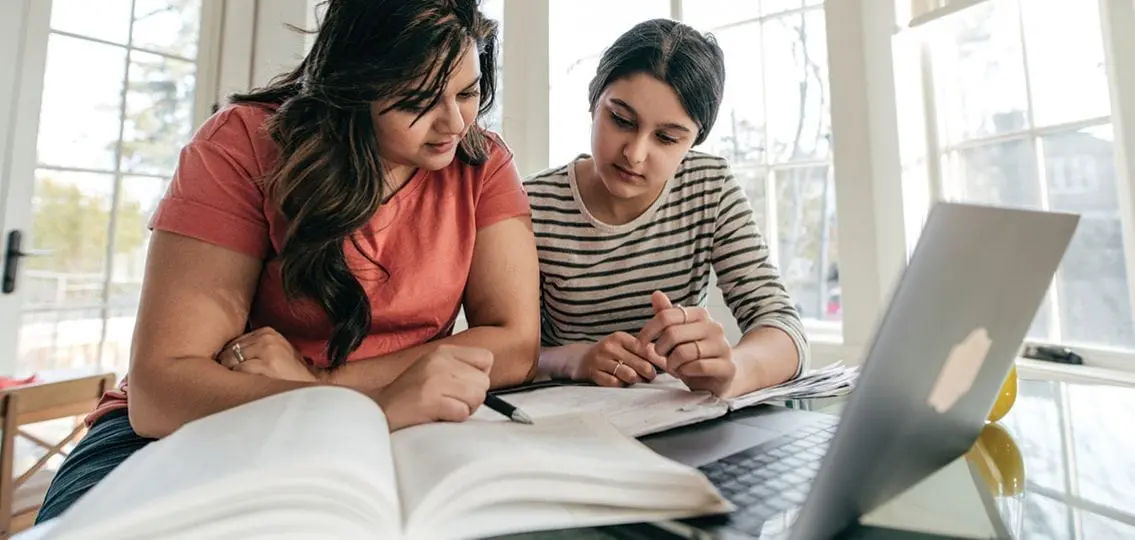As the pandemic continues, it seems distance learning is here to stay for the foreseeable future and, rather than treating it as an impossible challenge, maybe we should see it as an opportunity.

Non-traditional education isn’t unprecedented for some families, including mine. I homeschooled my four children for over a decade and I am not alone. According to the National Home Education Research Institute, over 2.5 million students were homeschooled last year in the United States. Experts expect that number to grow because of COVID-19.
I know from my personal experience that homeschooling is nothing to fear—even homeschooling for working parents. What are the best practices for online learning? Here are the ways to make the most of the homeschooling experience:
6 Important Homeschooling Tips
1. Change your mind set about remote learning
Before homeschooling can be a rewarding experience, we have to stop looking at remote learning as a crisis or an inevitable failure of our educational system. No one knows how long this pandemic will last, which means it’s time to put a plan in place for the entire family, including the kids, so everyone can thrive in the coming months.
As a family lawyer, who was also divorced (I’ve since remarried and have a blended family now), I homeschooled my four children for over a decade while building my law practice. It may sound like a nightmare, if not an impossibility, but I approached the experience from a perspective of gain, not loss. There are opportunities for teens to learn everywhere because a teen’s life is their classroom.
2. Help your teens find their passion
The best part of homeschooling or other non-traditional learning methods is that parents can tailor the experience toward their teens and how they learn best. As your teens experiment with various disciplines and subjects in a non-traditional environment, they will discover what they do best and enjoy it at their own pace.
Learning outside a classroom helped my now 18-year-old son discover his passion for mechanics. After he expressed an interest, I bought him a junker car as a gift. He knew very little about cars then, and I knew less, which left him to his own devices and the resources he had at his disposal. Using YouTube videos, he learned how to do repairs and eventually restored the car to its glory—building his confidence along the way. Then he moved on to a second and third car, never once needing a traditional classroom to learn these skills. Now he wants to study to become an engineer.
3. Enlist help
Co-parenting after a divorce can raise all sorts of issues, including decisions about education. Factor in an ongoing pandemic, and co-parents have more challenges than ever with regard to how best support their teens’ schooling from two homes instead of one. But there’s no need to go it alone.
Whether it’s extended family, friends, neighbors, or coworkers, you probably already know a team of “experts” who can help you navigate homeschooling or distance learning. If you’re separated or divorced, that includes your co-parent too. Sometimes, all you have to do is ask. Consider swapping your knowledge of a subject for their knowledge of something else—or even a home-cooked meal in exchange for their assistance.
4. Use technology to your benefit
When getting someone to teach in person isn’t possible, don’t hesitate to go online for additional curriculum opportunities. Platforms like YouTube offer endless educational channels and many colleges offer online courses for high school students. The same goes for industry-specific learning facilities specializing in fine arts, film, or drama.
Take advantage of family movie nights to create teachable moments. From documentaries to blockbuster films, the conversations that follow can be thought-provoking, not to mention chances to exchange information and ideas about history, literature, and current events.
5. Organize a learning pod
When attending brick and mortar school isn’t possible, parents have to come up with creative solutions to smooth the transition to distance learning. Because of the pandemic, many parents are choosing to create learning pods to facilitate educating small groups of students. Some are hiring a teacher to guide their pod’s learning experience or reaching out to volunteers in their community or even among the parents in their own pod. In response to the unusual circumstances, families are coming up with ingenious ways to ensure their teens receive a comprehensive educational experience.
6. Cherish the time
We may not have wanted this experience for ourselves or our teens, but the pandemic has given us a reason to slow down and take stock of what’s most important to us. For many of us, this time is an opportunity to strengthen our relationships with our teens. How we approach learning during this difficult time does not have to imply an end to education as we know it, but as a beginning of something different—an experience for parents and teens to learn what education looks like when you get to make your own rules.





